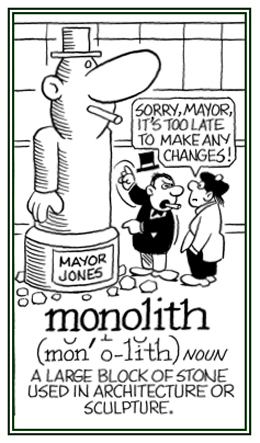litho-, lith-, -lith, -lithic, -lite, -liths, -lites
(Greek: stone, rock; hard consolidated mineral matter; hard matter formed from mineral and earth material; hard substance that is solid)
1. A tall block of solid stone standing by itself: The 887 monoliths, or monumental statues termed "moai" on Easter Island, were made of natural rock by the early Rapa Nui people.
2. A large uniform block of a single building material; such as, concrete pieced together with others to form a building or other stone-like structure: The huge bank, which was multinational, seemed to be like a monolith in the center of the town which consisted of older and smaller shops.
3. Symbolically, something massive and unchanging; especially, a large and long-established organization that is slow to change, uniform in character, and difficult to deal with on a human level: If the two corporations decide to merge, it would create a monolith in the food sector forcing the little markets to close down.

© ALL rights are reserved.
Go to this Word A Day Revisited Index
2. A large uniform block of a single building material; such as, concrete pieced together with others to form a building or other stone-like structure: The huge bank, which was multinational, seemed to be like a monolith in the center of the town which consisted of older and smaller shops.
3. Symbolically, something massive and unchanging; especially, a large and long-established organization that is slow to change, uniform in character, and difficult to deal with on a human level: If the two corporations decide to merge, it would create a monolith in the food sector forcing the little markets to close down.

Go to this Word A Day Revisited Index
so you can see more of Mickey Bach's cartoons.
monolithic
1. Consisting of or formed into a tall block of solid stone.
2. Constructed using massive stones or large seamless blocks of material.
3. A reference to something which is massive, uniform in character, and slow to change.
2. Constructed using massive stones or large seamless blocks of material.
3. A reference to something which is massive, uniform in character, and slow to change.
neolith
A Neolithic implement.
Neolithic
A reference to the period of human culture following the Mesolithic period; characterized by a great variety of polished stone, implements, and the development of new social forms based on primitive techniques in weaving, spinning, and pottery-making, and the introduction of a settled agriculture exploiting many new domesticated plants.
nephrolith
A calculus formed in the kidney; also known as a "kidney stone".
nephrolithiasis
The process of forming a kidney stone, an existing stone in the kidney; or lower down in the urinary tract.
Kidney stones are a common cause of blood in the urine and pain in the abdomen, flank, or groin and they occur in one in twenty people at some time in their lives.
nephrolithotomy, lithonephrotomy
Incision into the kidney for the removal of a renal calculus or "kidney stone".
oolite
1. A sedimentary rock, often shale, clay, or sandstone, that is made up of small spherical grains consisting of concentric layers.
2. A variety of limestone, consisting of small round grains, resembling the roe of a fish.
2. A variety of limestone, consisting of small round grains, resembling the roe of a fish.
oolith
ophthalmolith
A calculus (hardness, like a stone) of the lacrimal (tear) duct.
oscheolith
A concretion in the sebaceous glands of the scrotum.
otolith
A particle of calcium carbonate found in the inner ear of vertebrates and involved in sensory perception.
paleolith
Paleolithic
1. Of or relating to the cultural period of the Stone Age beginning with the earliest chipped stone tools, which took place about 750,000 years ago, until the beginning of the Mesolithic Age, about 15,000 years ago.
2. A technical name for the "Old Stone Age", a division of prehistory covering the time when humans first started to make tools out of stone.
2. A technical name for the "Old Stone Age", a division of prehistory covering the time when humans first started to make tools out of stone.
pancreatolithectomy
The surgical removal of a pancreatic concretion or the excision of a calculus from the pancreas.


